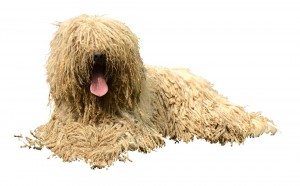Protective, loyal and devoted, don’t be surprised to see your Komondor following you from room to room. They are intelligent, steady and strong-willed pets that get along with children, but prefer being in a single-pet household.
You’d be forgiven for thinking your mop has come alive if there’s a Komondor in the house, but good luck trying to get your dog to clean the floors. They are more likely to sit back and watch over your every move. The Komondor is known for being extremely protective and loyal towards their family so don’t expect a warm welcome with strangers.
They are best suited to single-pet households as they won’t make friends with other dogs – also keep an eye on your pet when at the park. If socialised early on, they can befriend cats. Overall, they are affectionate dogs and are kid-friendly, although very young children aren’t ideal. A Komondor is best suited to experienced dog owners. They tend to suffer from separation anxiety so don’t leave your Komondor alone all day.
Fun fact: Bred in Hungary, their coat isn’t just for looks,
it helped them blend in with a flock of sheep. If a wolf
tried to prey on the sheep, a Komondor could surprise
the wolf and keep its flock of sheep safe.
They are intelligent dogs and the right person will find them relatively easy to train. Obedience training is a must. Consistency and patience is key to training a Komondor. They are loud barkers and known to be vocal.
Moderately active, your Komondor can be somewhat of a couch potato. Make sure to take them on long daily walks. An apartment suits your Komondor just fine, provided they get enough exercise.
This breed sheds moderately. While their corded coat doesn’t need to be brushed, it still needs an average amount of maintenance. At around 8-12 months of age the coat will start matting, very gently tear the mats apart to form small cords. Make sure to thoroughly dry them if wet or they might start to smell damp. Trim the hair inside the ear canal and trim the bottom of the feet. It’s best to find a dog groomer to help keep your dog’s coat looking its best.
Scheduled six-monthly health checks and visits to the vet are important to ensure your dog is healthy and happy throughout all life stages. It’s important that together with your vet a preventative healthcare program is determined and maintained based on the individual needs of your canine companion. Komondors are prone to elbow and hip dysplasia, bloat and eye diseases such as cataracts.
Size
A large-sized breed weighing 37-46kgs with an average height of 65-70cms.
Space
A Komondor is best suited to a large yard.
Energy Levels
They have moderate energy levels. A daily walk or two will keep this canine happy.
Difficulty Of Training
They are intelligent dogs and will learn quickly, however they do have a mind of their own.
Family suitability
Great family pets and loyal companions.
Suitability to other pets
If socialised from a young age, your dog will befriend other cats, however they don’t enjoy the company of other dogs. They are best suited to a single-pet household.
Need for company
They have a high need for company and enjoy being by their human’s side at all times.
Hypoallergenic dog breed?
No
Coat and grooming needs
This breed requires low to moderate maintenance. Keep their coat dry and free from parasites and dirt. Gently tear the large mats apart to allow them to form into small cords. Regularly check ears and trim hair when needed. They have a long corded white coat.
Shedding
They shed twice a year.
Tendency to bark
They have a high tendency to bark.

